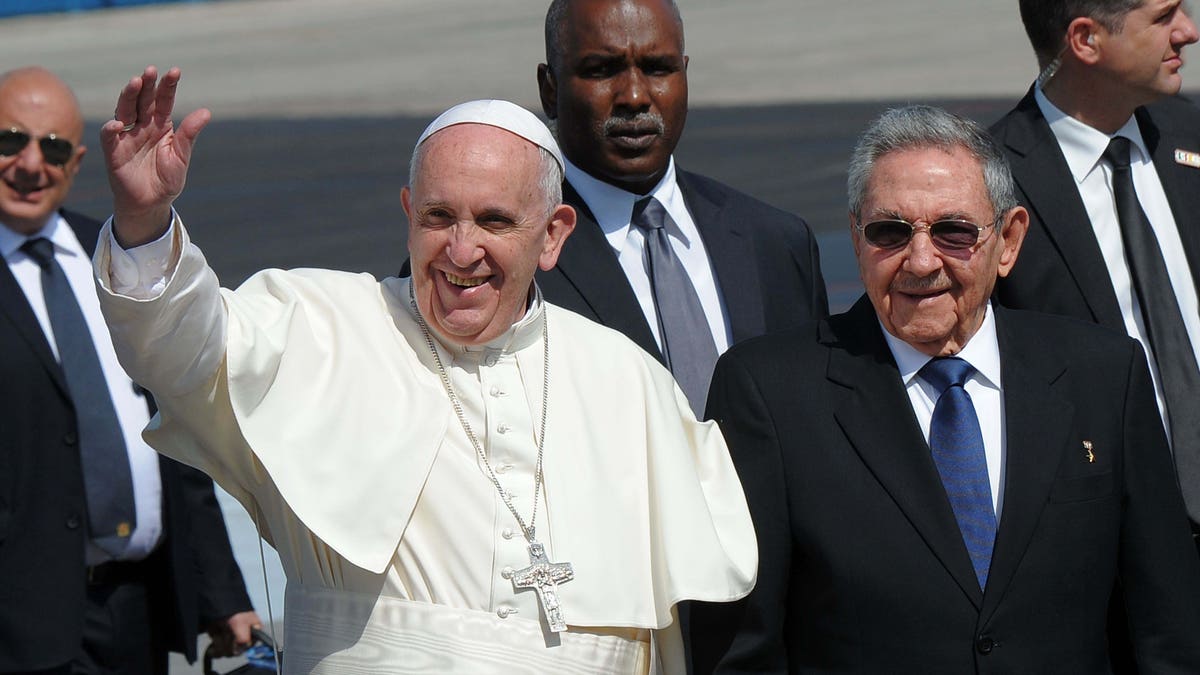
Pope Francis (L) is welcomed by Cuban President Raul Castro at the International Airport Jose Marti in Havana, on February 12, 2016. Pope Francis landed in Cuba Friday to meet with the head of the Russian Orthodox Church, the first such encounter since the two branches of Christianity split a millennium ago. The 79-year-old pontiff, in his white robes, stepped off an Alitalia plane and shook hands with Cuban President Raul Castro on the tarmac at Jose Marti airport, where he was then due to sit down with the Russian Patriarch Kirill. AFP PHOTO / YAMIL LAGE / AFP / YAMIL LAGE (Photo credit should read YAMIL LAGE/AFP/Getty Images)
Pope Francis' brief but historic visit to Cuba on Friday to meet with his Russian Orthodox counterpart, Patriarch Kirill, marked the pontiff’s second trip to the island in less than six months, an unprecedented amount of attention that the pontiff has lavished on the island.
Seemingly every time the Argentinian-born Francis, 79, travels to North America, he finds a reason to make a stop.
In September, en route to a World Meeting of Families congress in Philadelphia, he made a point to go to Cuba first; and now, on the way to Mexico, he arranged to end a 1,000-year-old doctrinal split between the Eastern and Western branches of Christianity in the unlikely setting of Havana’s José Martí International Airport.
But as much as Cuba has become a favorite stomping ground for Francis, the 79-year-old pontiff has left an even deeper impression on the island nation.
For one thing, it was through the mediation of the Vatican that the presidents of the United States and Cuba, Barack Obama and Raúl Castro, were able to begin the process of normalizing relations between the Cold War enemies.
“Cuba was as much of the discussion as anything else,” a senior administration said after a meeting between Obama and Pope Francis in March 2014. A Vatican meeting between U.S. and Cuban representatives followed, which led to a prisoner exchange and the announcement of the intention to normalize relations.
“The pope can be the trigger and get things started,” Greg Burke, Vatican communications director, told Fox News at the time.
Castro – whose brother Fidel “outlawed” Christmas in 1962 so that sugar cane workers could get another day in the fields – was so impressed by Francis that he vowed in May 2015 after an audience with the pontiff, "If the pope continues this way, I will go back to praying and go back to the Church, and I'm not joking."
And whether coincidentally or not, over the last couple of years, the Catholic Church in Cuba has started quietly expanding its social programs and influence while also rehabilitating a number of churches that had been ruined during the decades that the communist regime banned religious worship on the island.
When Francis came to the United States in September 2015 to attend a World Meeting of Families congress in Philadelphia, he made a point to stop in Cuba first. While there, he avoided overtly political acts or criticisms of the Cuban regime.
He declined to meet with dissident groups while choosing to visit former president Fidel Castro in his home.
The pope did speak up against all ideologies. "Why do we always throw a stone about that which divides us, instead of holding hands over what unites us?” Francis asked a group of young Cubans. “Let’s dare to talk about what we have in common, and then we’ll talk about our differences."
